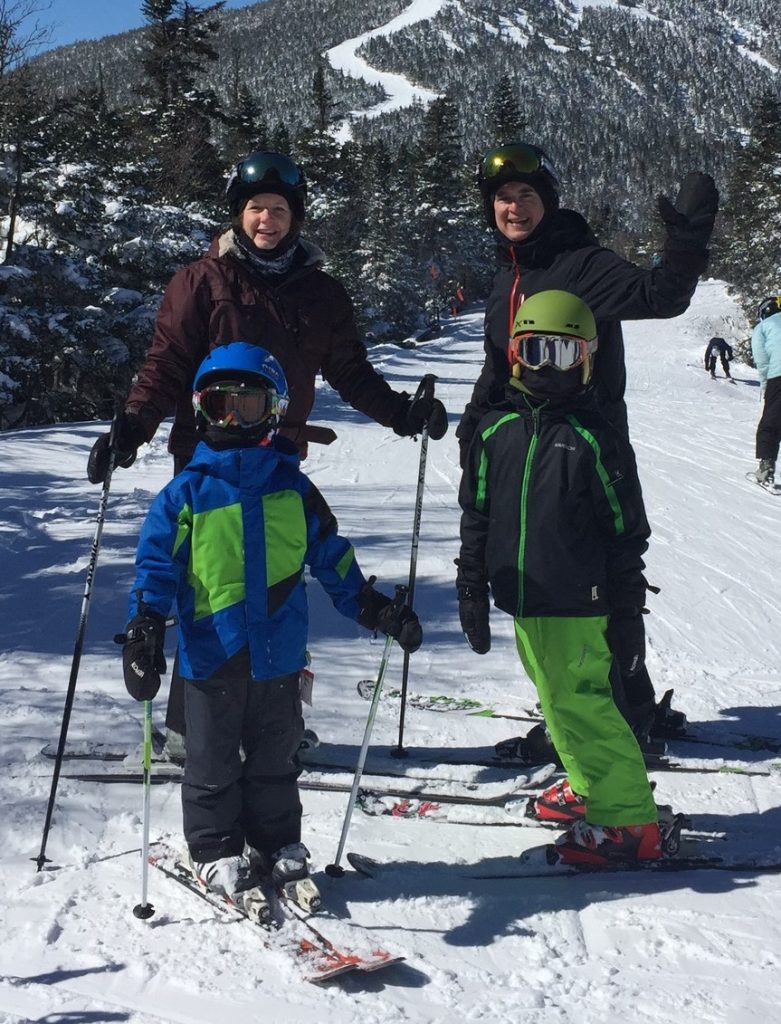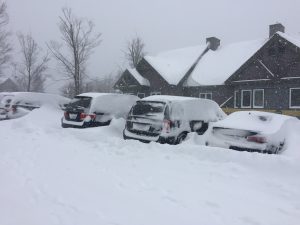
Sarah in Jay Peak, VT with husband Raul, and sons Connor (age 8) and Luke (age 10), who skis with two EpiPens on him at all times.
We asked Sarah Nicholl, co-leader of the Toronto Anaphylaxis Education Group (TAEG) to share her advice on how to travel safely and without stress during the winter months.
Sarah’s tips are from her own experiences travelling with her family to places both near and far. She has two sons; one of her sons is a 10-year-old boy at risk for anaphylaxis to dairy, egg, peanuts, and tree nuts.
Driving long distances
Sarah and her family have taken long drives to Florida, or shorter excursions to places like Jay Peak, Vermont for skiing. “We always have all our food with us,” she says. “We have a GPS and a backup GPS, so we know where the hospitals are when we’re driving. Not that we’ve ever needed to use it, but it makes us feel better. Just knowing where the resources are along your route and having enough food if the weather turns bad gives you extra security.”
Accommodations and food
“We always rent a place with a full kitchen, a two-bedroom condo at Jay Peak, for example,” Sarah explains. “And we plan our week’s menu and bring a lot of food. We buy safe food in advance, pre-cook and freeze the meals and then take it all with us to Vermont in coolers.”
”If we’re going to stay somewhere for any length of time, we always book places with separate bedrooms and a kitchen,” she says. “Because we’re not spending on restaurants, we can spend more on our accommodations, and we’re much more comfortable and relaxed in the evenings [than in a hotel room].”
Spreading out the workload
“We usually travel to Vermont with another family,” Sarah says. “And we split the cooking with them. They do dinner half of the days and we do the other half. It works really well, and you get a bit of a break. Plus it’s nice to relax in the condo after a day of skiing with pre-prepped meals, rather than manage kids in a restaurant.”
In case of harsh weather conditions
“In 2017, we were at Jay Peak when the Stella winter storm hit, when five feet of snow fell in two days,” Sarah says. “[In that situation], we didn’t introduce any new or different foods to my son, so we didn’t run any kind of risk of a reaction while the weather was so severe. We knew we wouldn’t be able to get to a hospital if we needed to, because road conditions were terrible, and people were stuck on the highway.”
Travelling by plane or train
Sarah and her family recently travelled to Costa Rica to visit her husband’s family. They flew on one of the many airlines that charge separately for meals, so the airline was accustomed to passengers bringing their own prepared meals. “We had a soft cooler bag with enough food for all four of us for our entire time at the airport, on the plane, and for a period of time when we arrived,” Sarah explains. She does caution that certain foods could be considered liquids by airport security and won’t be permitted in carry-on luggage so it’s good to pack those items in checked bags.
“On the plane, we wiped everything down and put a cover on the seats because my son gets hives just from contact, say if someone spilled milk [which he is allergic to] previously,” Sarah explains. “There were no touchscreens on this particular flight, but [in other flights that have them] we always wipe those down too, because they can be covered in allergens.”
“We had no problems on the plane, either going there or coming back.”
[Editor’s note: It’s important to remember that airlines cannot heat up food or keep food cold for you. Ensure you don’t bring anything that needs to be heated or requires a refrigerator. Also, when flying, it’s always a good idea to bring a doctor’s note with you, indicating your child’s allergies and that they should be carrying an epinephrine auto-injector. Contact your doctor ahead of time to get any paperwork the airline needs.]
Benefits of planning in advance
“I’m a planner, so I was used to doing spreadsheets before I had a son with allergies,” Sarah says. When you have a child with food allergies, you need to be more prepared prior to travelling. “I have meal plans for vacations planned out in advance. And a lot of things that are better for travelling with allergies, actually make it a lot easier to travel with kids anyway.”
”When you plan ahead, take your EpiPens®, and know where the hospitals are [in advance], you can go to lots of spots and have a great vacation.”
More information
Last November, the Toronto Anaphylaxis Education Group hosted a panel session on travelling with allergies. Sarah tells us, “We had several different members sharing their experiences of visiting Ottawa, Mexico, Disney World, plus a general travel tips panel, and our family’s experiences travelling to Vermont and Costa Rica. All of the slide shows and meeting notes from those sessions are available online.”
Thank you, Sarah for your insightful tips on staying safe when travelling with allergies. For more tips on travelling, visit the travel section on our website.
Tags: community, teag, Travelling, winter vacation
